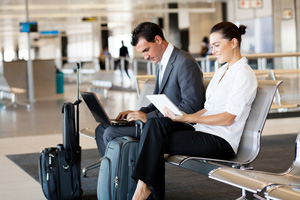Corporate travel is showing strong signs of growth, despite increasing economic hurdles. The Global Business Travel Association’s latest poll indicates optimism among travel buyers.
With rising bookings and spending figures from last year, businesses are preparing to embrace more travel opportunities in the coming year, albeit with caution in specific regions.
The Current Landscape of Corporate Travel
Corporate travel is on an upward trajectory, despite an environment where costs continue to rise. According to a recent Global Business Travel Association (GBTA) poll, an impressive three out of five corporate travel buyers anticipate an increase in travel volumes this year compared to last. This optimism comes even as buyers acknowledge a challenging economic landscape. Overall, corporate travel activity is expected to surge, marking a revival for the industry post-pandemic.
Furthermore, the poll revealed that four out of five buyers reported increases in both bookings (83%) and spending (84%) in 2023. Over half of the respondents (59%) are forecasting a further increase in travel volume this year. Two-thirds (66%) expect an increase in travel spending, indicating a willingness to invest in business travel notwithstanding prevailing economic challenges. The survey highlights a resilience and optimism in the sector.
Regional Differences in Travel Sentiment
Significant regional differences in business travel trends have emerged, with North America demonstrating more robust growth expectations than Europe. The survey indicated that 66% of travel buyers in North America foresee an increase in travel this year, whereas in Europe, only 37% share this sentiment. This disparity underscores varying economic and market conditions across the regions and reflects a broader caution in European markets.
Another stark distinction between the regions concerns the issue of climate change. While climate and sustainability take precedence for 41% of European respondents, only 12% in North America exhibit the same level of concern. This difference suggests diverging priorities and external pressures shaping travel agendas across the Atlantic.
Factors Affecting Corporate Travel
In addition to economic uncertainties, rising travel costs and corporate budget constraints are major concerns influencing corporate travel decisions. Two-thirds of those surveyed pinpointed rising travel costs as the predominant issue.
Economic uncertainty follows closely with 46% citing it as a primary concern, while 42% point to restrictive company budgets. A third of respondents are wary of travel disruptions, a further challenge to travel management strategies. As these issues persist, they will likely influence future travel decision-making.
Interestingly, more than half of the participants (57%) believe that comparing the current performance of the travel sector to pre-pandemic levels is no longer relevant. However, 32% still find these comparisons useful, indicating a divided opinion on benchmarking standards.
The Impact of Hybrid Work Models
The rise of hybrid work models has altered the dynamics of corporate travel policies. The poll discovered that almost two-thirds (62%) of respondents are operating under hybrid work models, with 27% having revised their business travel policies accordingly. Another 21% plan to adjust their programmes shortly. This shift reflects a growing acceptance of flexible working arrangements and their impact on travel needs.
Furthermore, the poll highlighted that 27% of companies have seen a rise in travel costs linked to hybrid and remote working. The need to adapt travel policies is evident as companies navigate this new working environment.
Workforce Challenges in the Travel Sector
The challenges in attracting and retaining talent within the corporate travel sector are significant. Approximately half of the respondents pointed to uncompetitive salaries and benefits as barriers. Nearly half (48%) also reported difficulties in finding qualified candidates, and 40% attributed a lack of investment in staff retention. This situation presents an obstacle for companies seeking to maintain a skilled workforce.
Despite these issues, only 14% of travel buyers plan to increase staff numbers this year. In contrast, nearly half (46%) of suppliers intend to expand their teams, revealing a disparity in staffing strategies between buyers and suppliers. This indicates differing approaches to managing workforce challenges within the sector.
Artificial intelligence is another point of divergence, with 27% of suppliers concerned about its development compared to just 13% of buyers. This illustrates varying levels of acceptance and readiness to integrate emerging technologies.
Trends and Future Projections for Business Travel
The poll results suggest that external customer meetings will drive 36% of business trips this year, with industry conferences and events, internal meetings, service trips, training, and supplier meetings accounting for the remainder. Suzanne Neufang, the GBTA chief executive, expressed optimism about the sector’s outlook, noting “strong indicators for continued growth in travel in 2024”.
The industry seems to have moved beyond the pandemic, with a renewed focus on sustainable growth and adapting to new market realities. As businesses navigate these changes, the evolution of travel programmes and sustainable options will be essential.
Conclusion
Overall, the findings from the GBTA poll showcase promising signs for the corporate travel industry, despite the cost challenges and economic uncertainties it faces. Companies are charting a path forward with a focus on resilience and adaptability, ready to embrace new trends and meet upcoming challenges, keeping growth a priority.
The GBTA poll results indicate a positive outlook for corporate travel growth, navigating through costs and uncertainties. Companies are proactive, with a focus on sustainability and evolving travel needs.
Embracing these trends positions the industry for continued prosperity, despite challenges. Adaptation and resilience remain key for future success.

